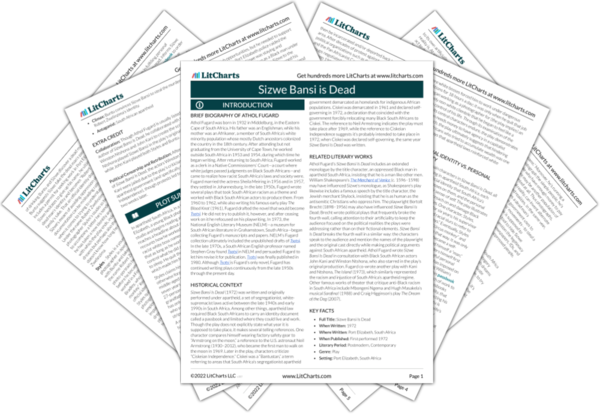In the play Sizwe Bansi Is Dead, set in South Africa under apartheid, there exists a third category between truth and lies: dreams. Although dreams aren’t true, they could become true—and so they motivate people, even oppressed and relatively powerless people, to try to change their reality. Yet at the same time, oppression compromises people’s ability to realize their dreams; thus, it’s unclear whether dreams are healthy motivators or cruel false hopes under oppressive political conditions such as apartheid. One of the play’s characters, a Black South African photographer named Styles, considers the photographs he takes a method of validating his customers’ dreams. He recalls one customer, a 48-year-old man who hadn’t received a good formal education but went on to earn a completion certificate after taking a correspondence course for seven years. The man wants Styles to take a photo of him with the certificate and declares his intention to keep taking correspondence courses until he’s a real “graduate.” Given the man’s age and the years it took him to earn the first certificate, it isn’t clear whether he ever will become a graduate—yet his dream, by motivating him to continue studying, makes it a possibility, albeit a dim and distant one. Similarly, when a newly employed man, Sizwe Bansi, comes to Styles’s studio, Styles takes one picture of Sizwe dressed as a successful businessman and another of Sizwe mid-walk, as though travelling to visit his wife and children. The play later reveals that Sizwe stole a dead man’s passbook to access more employment opportunities and support his family; thus, the photographs Styles takes of Sizwe clearly represent a dream he is trying to achieve. Sizwe’s dream has already motivated him to take major, dangerous action (stealing the dead man’s passbook), which demonstrates the importance of dreams to the characters’ lives despite dreams’ ambiguous status between the real and the fake. Yet the play ends on a note of uncertainty about how long Sizwe can get away with impersonating a dead man, leaving ambiguous whether Sizwe’s dream has genuinely improved his prospects in life or given him false hope and put him in terrible peril.
Dreams ThemeTracker

Dreams Quotes in Sizwe Bansi Is Dead
STYLES: This is a strong-room of dreams. The dreamers? My people. The simple people, who you never find mentioned in the history books, who never get statutes erected to them, or monuments commemorating their great deeds. People who would be forgotten, and their dreams with them, if it wasn’t for Styles. That’s what I do, friends. Put down, in my way, on paper the dreams and hopes of my people so that even their children’s children will remember a man . . .

Unlock explanations and citation info for this and every other Sizwe Bansi Is Dead quote.
Plus so much more...
Get LitCharts A+STYLES: Something you mustn’t do is interfere with a man’s dream. If he wants to do it standing, let him stand. If he wants to sit, let him sit. Do exactly what they want! Sometimes they come in here, all smart in a suit, then off comes the jacket and shoes and socks . . . [adopts a boxer’s stance] . . . ‘Take it, Mr Styles. Take it!’ And I take it. No questions! Start asking stupid questions and you destroy that dream.
STYLES: You must understand one thing. We own nothing except ourselves. This world and its laws, allows us nothing, except ourselves. There is nothing we can leave behind when we die, except the memory of ourselves.
STYLES: Here he is. My father. That’s him. Fought in the war. Second World War. Fought at Tobruk. In Egypt. He fought in France so that this country and all the others could stay Free. When he came back they stripped him at the docks—his gun, his uniform, the dignity they’d allowed him for a few mad years because the world needed men to fight and be ready to sacrifice themselves for something called Freedom […] When he died, in a rotten old suitcase amongst some of his old rags, I found that photograph. That’s all. That’s all I have from him.
MAN: I don’t want to leave Port Elizabeth.
BUNTU: Maybe. But if that book says go, you go.
MAN: Can’t I maybe burn this book and get a new one?
BUNTU: Burn that book? Stop kidding yourself, Sizwe! Anyway, suppose you do. You must immediately go apply for a new one. Right? And until that new one comes, be careful the police don’t stop you and ask for your book. Into the Courtroom, brother. Charge: Failing to produce Reference Book on demand. Five rand or five days.
MAN: It will tell you in good English where he stays. My passbook talks good English too . . . big words that Sizwe can’t read and doesn’t understand. Sizwe wants to stay here in New Brighton and find a job; passbook says, ‘No! Report back.’
Sizwe wants to feed his wife and children; passbook says, ‘No.’
BUNTU: It’s your only chance!
MAN: No, Buntu! What’s it mean? That me, Sizwe Bansi . . .
BUNTU: Is dead.
MAN: I’m not dead, friend.
BUNTU: We burn this book . . . [Sizwe’s original] . . . and Sizwe Bansi disappears off the face of the earth.
MAN: A black man stay out of trouble? Impossible, Buntu. Our skin is trouble.











